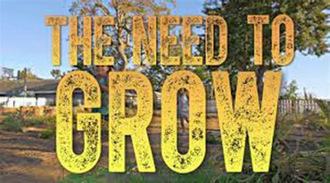Review: 'The Need To GROW'

'The Need To Grow' is a documentary about sustainable food. It asks: Did you know that leading researchers tell us we're losing topsoil so fast, we're on course to run out of farmable soil in just 60 years?
It suggests that, "at this rate, we'll run out of food in the next couple of generations." But, the documentary offers hope too.
'The Need To Grow' captures the roots of agricultural problems in the United States, particularly the unsustainable path of industrial agriculture.
Yet, it suggests we can feed the world without destroying the planet. And it is pushing the message so strongly that it has made viewing of the documentary available online.
The film focuses on three main characters: eight-year old Girl Scout, Alicia Serratos; a regenerative urban farmer, Erik Cutter; and inventor, Michael Smith. Serratos leads a petition for non-GMO girl scout cookies, that is biscuits without genetically modified organisms; Cutter seeks to grow food in a resource-efficient manner; Smith's Green Power House invention functions as a closed-loop energy generator that sequesters carbon, grows algae, and produces a nutrient-rich, organic soil vitalizer.
'The Need to Grow' suggests we should all be localising and diversifying the food system via regenerative agriculture, in which soil health becomes a top priority. "We cannot feed the world from dead soil" and "food these days is lacking in nutrients" are among the comments. Solutions presented in the film include using gardens to grow food, seed saving, composting, biochar, and more.
We are urged to move towards accessing natural, non-GMO, unprocessed foods to improve health, energy, and prevent disease. This will mean an end to the use of synthetic pesticides and fertilisers. There is concern about food waste, particularly that which is put in landfill rather than a compost pile. "Our soil is starving for organic matter and yet much organic matter is not composted." And, clearly, healthy food, water, soil, and air is in the interests of all creatures.
Well, not all humans it seems. "Food security is at risk for greater profit," sums up the tension with big agribusiness which pushes the industrial model, including GMOs and chemical inputs, "that kill just about everything except the crop". And I found it surprising that the Girls Scouts took four years to take up young Alicia's campaign. International Indian environmentalist Vandana Shiva had supported it much earlier, telling Alicia that "I do not despair ever… I save seeds."
It niggles me that the film doesn't truly acknowledge those who have been making these points for many years, particularly in the global south. After years of campaigning by small-scale farmers' organisations such as La Via Campesina, in 2018 the United Nations issued a declaration of rights for small-scale food producers. They hope this will be an important step to help protect small farmers and help to keep foods biodiverse and nutritious. In 2010, the National Justice and Peace Conference heard Vandana Shiva and eco-theologian Fr Sean McDonagh make these points at its annual conference in the UK, where the theme was, 'Our daily bread - food security, people and planet.' The Soil Association ran a stall at that conference.
However, the film is a contribution towards sustainable food production. It is clear that more and more people are actively looking to make choices that are better for them and for the planet. Consumers want to know how food is grown and cooked, championing the importance of well-sourced ingredients. As the documentary says, access to safe, nutritious food is a basic human right for us and for future generations.
A free screening is available online at: https://grow.foodrevolution.org/


















